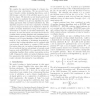105 search results - page 16 / 21 » Linear Time Algorithm for Weak Parity Games |
SAGT
2010
Springer
13 years 6 months ago
2010
Springer
The PPAD-completeness of Nash equilibrium computation is taken as evidence that the problem is computationally hard in the worst case. This evidence is necessarily rather weak, in ...
SDM
2007
SIAM
13 years 9 months ago
2007
SIAM
We consider the supervised learning of a binary classifier from noisy observations. We use smooth boosting to linearly combine abstaining hypotheses, each of which maps a subcube...
PET
2004
Springer
14 years 1 months ago
2004
Springer
Internet computing technologies, like grid computing, enable a weak computational device connected to such a grid to be less limited by its inadequate local computational, storage,...
JMLR
2010
13 years 2 months ago
2010
Round-based games are an instance of discrete planning problems. Some of the best contemporary game tree search algorithms use random roll-outs as data. Relying on a good policy, ...
ISAAC
2005
Springer
14 years 1 months ago
2005
Springer
Consider an information network with harmful procedures called attackers (e.g., viruses); each attacker uses a probability distribution to choose a node of the network to damage. O...


